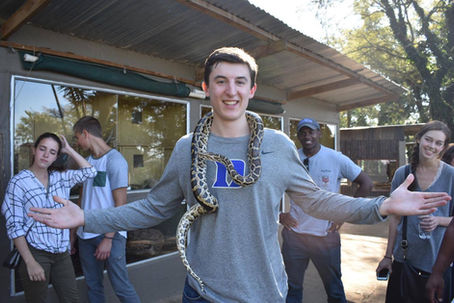Meet Auntie Lorna!
- Hannah Chen
- Aug 3, 2017
- 4 min read










For the past two months, I’ve been living with Auntie Lorna! No, she is not actually my aunt. In Durban, you call “elderly” women aunties and “elderly” men uncles. Auntie Lorna is your stereotypical grandma. She has absolutely no clue how to work electronics, and I must check her cellphone every day to catch her up on who has texted or called her. Last week, I taught her how to respond to a message and upload pictures to Facebook. We eat a DELICIOUS home cooked dinner every night at 5pm and finish just in time to watch the daily 5:30 showing of Deal or No Deal. After Deal or No Deal, we watch Pointless, a show similar to Family Feud except there are four teams of two, and the objective of the game is the pick a correct answer, but also the answer in which you think people know the least – really a quite interesting game show. I would recommend. If we’re not too tired by the time Pointless is over, we watch Idols Extra and make fun of the really bad contestants or Catfish (she’s convinced every person will turn out to be “a big fat man” of a different race they say they are). She goes to bed by 9pm every night and is up by 4am. She waves hello to every child walking by on their way to school every morning. These are the same kids she yells at if they’re speaking “too loudly” for 6pm. Auntie Lorna knits, falls down a lot, likes to wear bright colors, and loves flowers. She knows EVERYONE. During my time here, she’s taken me to over 30 different houses for tea. She is retired and part of the Pension Club, which meets every Tuesday. She volunteers at John Dunn every Thursday, and choir practice also takes place on Thursdays. She has two daughters who live in Johannesburg and used to have a dog named Bruno until he got too big for her. Fortunately, Bruno’s new owners live down the road so she is still able to visit Bruno as often as she likes. Recently, Bruno has been breaking out of his gate and coming over to Auntie Lorna’s during the day to hang out.
Auntie Lorna lived under the apartheid until she was in her 60s. To my surprise, Auntie Lorna didn’t per say liked the apartheid, but she thought her life was better under the apartheid than her life now. During this period, Whites, Indians, Coloureds, and Blacks had their own set of rights. Each race was forced to live in designated areas only with people of their own race. Auntie Lorna is Coloured and still proudly identifies herself as Coloured today (as most all South Africans still proudly claim and identify with the race in which they were given based on their looks). This meant that she only could enter through the back entrance of restaurants, sit at the top deck of double decker buses because the bottom was reserved for Whites. Certain parts of the beach were designated as the “Coloured” part of the beach. Though all of these things infuriated her, she was not one to protest.
In the words of Auntie Lorna, “the apartheid kept people in line.” Before, people could live anywhere they wanted. And they did! Most all neighborhoods were a mixture of Blacks, Whites, Indians, and Coloureds. But, when neighborhoods were this way, “there was no harmony.” Everyone kept to themselves, not knowing who they could trust within their own community and not wanting to greet those who they thought were beneath them. “Blacks would break into houses and steal.” “Whites would be scared of everyone and never said hello to anyone.” Everyone lived in fear. Only when people were required to live with people of their own color did peace occur. No one fought or stole, and everyone greeted and respected each other “because they understood they were all equals.”
Even though the apartheid is over, people still mostly live in their respected areas, well at least in Durban. I can’t say the same for Cape Town.
Collin, an Indian man we met early on in the program, was very anti-apartheid and protested heavily. Though he has opposite views about the apartheid from Lorna, he also agrees that people enjoy living with people of their own race. Even people moving to Durban like to look for neighborhoods that are predominately their color.
I had always assumed that EVERYONE thought the apartheid was evil. I was so sure that Auntie Lorna would describe her time under the apartheid as her “dark days.” I was visibly shocked when she told me that she liked her life better under the apartheid, but after further explanation and learning more about how race is perceived in Durban currently, I understand where she is coming from. From living with Auntie Lorna I’ve learned so much about what it means to life humbly, the importance of blood family and chosen family, and South African culture in general.
My time with Auntie Lorna has been invaluable.






Comments